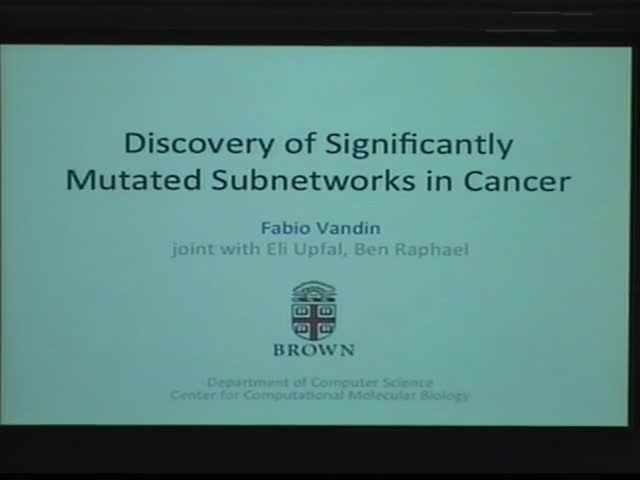Discovery of Significantly Mutated Subnetworks in Cancer
Presenter
February 29, 2012
Keywords:
- DNA sequences
MSC:
- 92D20
Abstract
Cancer is a disease that is driven by somatic mutations that accumulate in the genome during an individual’s lifetime. Recent advances in DNA sequencing technology are enabling genome-wide measurements of these mutations in numerous cancers. A major challenge in analyzing this data is to distinguish functional mutations that drive cancer progression from “passenger” mutations not related to the disease. Recent cancer sequencing studies have shown that somatic mutations are distributed over a large number of genes. This mutational heterogeneity is due in part to the fact that somatic mutations target cellular signaling and regulatory pathways, and that a mutation in dozens of possible genes might be sufficient to perturb a pathway. While some of these pathways are well characterized, many others are only approximately known. Standard pathways analysis methods test the enrichment in somatic mutations of know pathways, reducing the ability to identify novel sets of mutated genes or crosstalk between mutated pathways.
I will describe HotNet, an algorithm to identify subnetworks of an interaction network that are mutated in a significant number of cancer genomes. HotNet models mutations as heat sources and employs a heat diffusion process on the interaction network to find “hot subnetworks.” The heat diffusion process is efficiently computed using the Laplacian matrix of the network, and considers both the frequency of mutation of the genes and the topology of the network. We also derive a statistical test to rigorously assess whether the number of hot subnetworks is significant under a suitable null hypothesis, and to bound the false discovery rate (FDR) of the hot subnetworks identified by HotNet. I will illustrate applications of these algorithms to data from The Cancer Genome Atlas, a project that is characterizing the genomes of thousands of samples from dozens of cancer types.
